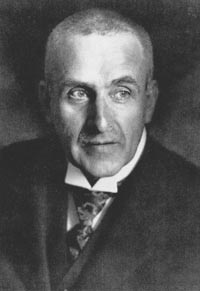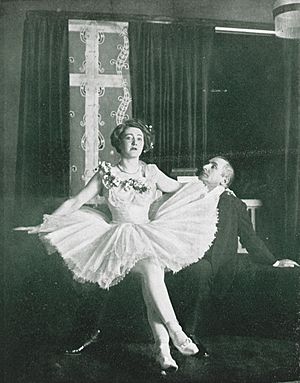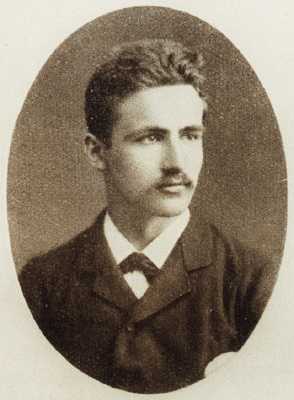Frank Wedekind facts for kids
Quick facts for kids
Frank Wedekind
|
|
|---|---|
 |
|
| Born |
Benjamin Franklin Wedekind
July 24, 1864 |
| Died | March 9, 1918 (aged 53) |
| Occupation | playwright |
| Relatives | Erika Wedekind (sister) |
| Family | Wedekind zur Horst |
| Signature | |
Benjamin Franklin Wedekind (born July 24, 1864 – died March 9, 1918) was an important German playwright. A playwright writes plays for the theater.
His plays often criticized the common ideas and ways of thinking of his time. His work was very new and helped shape future styles of theater, like expressionism and epic theatre.
For a long time, Wedekind was most famous for his "Lulu" plays. These were two plays called Erdgeist (Earth Spirit, 1895) and Die Büchse der Pandora (Pandora's Box, 1904). They were about a mysterious young woman named Lulu.
In 2006, another one of his earlier plays became very well-known. This play was Frühlings Erwachen (Spring Awakening, 1891). It became famous because it was made into a popular Broadway musical.
Contents
Life and Early Career
Benjamin Franklin Wedekind was born on July 24, 1864, in Hanover, which was part of the German Confederation at the time. His mother was Swiss and his father was German.
His family moved from Hanover in 1872, and Wedekind grew up in a Swiss castle that his father owned. He was an American citizen until World War I. This allowed him to travel a lot around Europe.
He spent most of his adult life living in Munich, Germany. For a short time in 1886, he worked in advertising for the Maggi soup company in Switzerland.
Wedekind had many different jobs before becoming a writer. He worked in business and even in the circus. Later, he became an actor and a singer.
He was very popular as a star in a satirical cabaret show called Die elf Scharfrichter ("The Eleven Executioners"). This show started in 1901.
Wedekind had a big impact on German satirical writing for the theater. Satire uses humor, irony, or exaggeration to criticize people's mistakes or foolishness. He inspired many future writers who used satire to comment on society.
When he was 34, Wedekind spent some time in prison because of some of his satirical poems. After this, he became a dramaturg at the Munich Schauspielhaus. A dramaturg helps choose and adapt plays for a theater.
Later Life and Family
In 1906, Frank Wedekind married Tilly Newes, an Austrian actress. She was 22 years younger than him. They had two daughters named Pamela and Kadidja.
Wedekind was known to be very jealous in his marriage. This made his relationship with Tilly difficult, and she tried to separate from him.
Near the end of his life, Wedekind had an operation called an appendectomy. He started acting again very soon after, which caused another health problem called a hernia.
His doctor did not want to operate right away, but Wedekind insisted. There were problems during the surgery, and he passed away at the age of 53 on March 9, 1918.
Tilly Wedekind, his wife, continued to act in films. She also wrote a book about her life in 1969, called Lulu: Die Rolle meines Lebens.
Frank Wedekind's great-grandson was the famous English writer Douglas Adams. Douglas Adams wrote The Hitchhiker's Guide to the Galaxy.
Major Works
Wedekind's most famous plays were the "Lulu" plays: Erdgeist (Earth Spirit, 1895) and Die Büchse der Pandora (Pandora's Box, 1904).
Another important play was Franziska (1910). In this play, the main character, a young girl, makes a deal with the Devil. She sells her soul to experience life as a man, believing men have more advantages.
Many of Wedekind's works have been translated into English.
List of Key Plays and Stories
- Frühlings Erwachen (The Awakening of the Spring, 1891)
- Erdgeist (Earth Spirit, 1895)
- Die Kammersänger (The Court-Singer, 1899) – a one-act play
- Der Marquis von Keith (The Marquis of Keith, 1901)
- Mine-Haha, or On the Bodily Education of Young Girls (1903) – a short novel
- König Nicolo oder So ist das Leben (King Nicolo, or Such is Life, 1902)
- Die Büchse der Pandora (Pandora's Box, 1904)
- Hidalla oder Sein und Haben (Hidalla, or Being and Having, 1905)
- Totentanz (The Dance of Death, 1905)
- Musik (Music, 1906)
- Schloss Wetterstein (Castle Wetterstein, 1910)
- Franziska (1912)
- Bismarck (1916)
- Herakles (Heracles, 1917)
Plays Made into Films and Musicals
Wedekind's "Lulu" plays have been adapted many times. They were used for a famous silent film called Pandora's Box (1929), starring Louise Brooks.
They also inspired a famous opera called Lulu (1937) by Alban Berg. An opera is a play where most of the words are sung.
In 2011, the rock musician Lou Reed and the heavy metal band Metallica released an album called Lulu, which was also based on these plays.
Wedekind's short novel Mine-Haha, or On the Bodily Education of Young Girls (1903) was made into two films: Innocence (2004) and The Fine Art of Love (2005).
In 2006, his play Frühlings Erwachen was turned into a very successful Broadway musical called Spring Awakening.
See also
 In Spanish: Frank Wedekind para niños
In Spanish: Frank Wedekind para niños
 | Bayard Rustin |
 | Jeannette Carter |
 | Jeremiah A. Brown |



